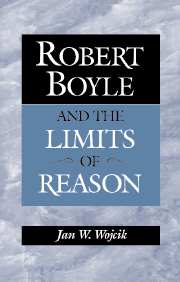Introduction
Published online by Cambridge University Press: 24 November 2009
Summary
Robert Boyle as Lay Theologian
Robert Boyle's status as a lay theologian was recognized in the seventeenth century and has been acknowledged ever since. In the sermon preached at Boyle's funeral in 1692, Gilbert Burnet, Bishop of Salisbury and one of Boyle's confessors, characterized him as one of those individuals who
have directed all their enquiries into Nature to the Honour of its great Maker: And have joyned two things, that how much soever they may seem related, yet have been found so seldom together, that the World has been tempted to think them inconsistent; A constant looking into Nature, and a yet more constant study of Religion, and a Directing and improving of the one by the other.
In 1701, Jeremy Collier, in his Great Dictionary, placed more emphasis on Boyle as a lay theologian than on Boyle as a natural philosopher. And in his Memoirs of the Lives and Characters of the Illustrious Family of the Boyles, Eustace Budgell described the relationship between Boyle's theological writings and his scientific writings much as had Burnet, noting that he had “often blended Religion and Philosophy happily enough together; and made each serve to illustrate and embellish the other.”
- Type
- Chapter
- Information
- Robert Boyle and the Limits of Reason , pp. 1 - 24Publisher: Cambridge University PressPrint publication year: 1997

